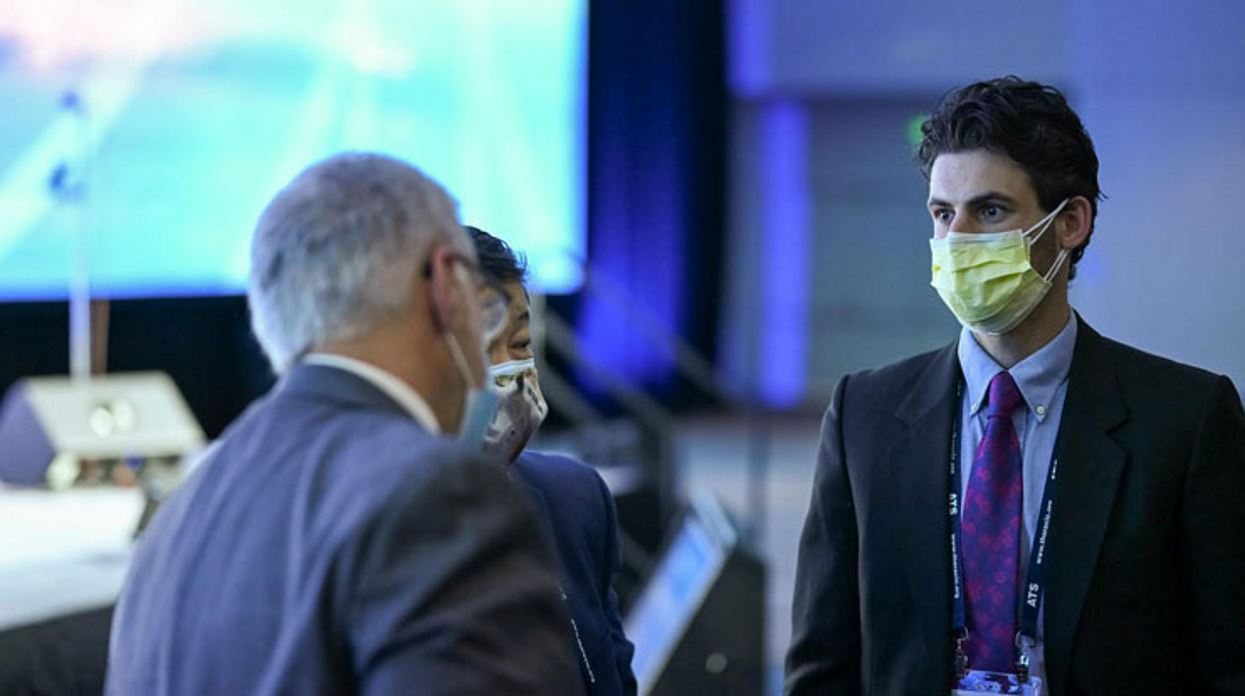
Freedom from Nicotine: Pharmacy Alum Influences Policy on an Army Base

Adam Edward Lang, PharmD ’14, was recognized by the American Thoracic Society for his research, policy work, and advocacy.
Adam Edward Lang, PharmD ’14, lives by two pieces of advice he learned from MCPHS professors—don’t let conventional ideas of a career guide you and act when you see a need in your environment.
Dr. Lang has done exactly that as Chief of Health Management and Deputy Chief of the Department of Pharmacy at McDonald Army Health Center at Fort Eustis in Virginia. He saw an influx of Army recruits who would benefit from tobacco treatment and led an effort to implement a nicotine-free policy for them. He was recently awarded the Public Service Award by the American Thoracic Society (ATS) for his advocacy.
“I'm the only person with a pharmacy background to have ever received a respiratory health award from ATS,” Dr. Lang said.
Dr. Lang worked at the McDonald Army Health Center for five years as a clinical pharmacist before applying for his current position. Even as a clinical pharmacist, he ran public health initiatives, setting him up for an unconventional career path. He has many responsibilities, including supervising a team of clinical staff and overseeing the center’s Healthcare Effectiveness Data and Information Set (HEDIS®) metrics, a comprehensive set of standardized performance measures.
He also sees patients and has an opportunity to meet with many soldiers. He learned something surprising in conversations with new recruits. During basic training, recruits were prohibited from using any tobacco products for ten weeks, and it seemed to stop many of them from using nicotine. When the prohibition was removed for advanced individual training (AIT), however, some recruits would either become new tobacco users or restart using.
Dr. Lang wanted to investigate further and drew on his love of data to create and distribute a confidential survey that was administered at the base. The survey results supported his observations. For example, there was a statistically significant reduction in the nicotine usage rate among soldiers in AIT compared with the rate among incoming recruits prior to joining the military. But some soldiers did start using nicotine for the first time after completing basic training. Of the soldiers who were not nicotine users before the military, 6.6% were using during AIT.
Dr. Lang presented the results of the survey to military leadership at Fort Eustis and recommended extending the prohibition of tobacco products through AIT.
“In the Army, our goal is to have the healthiest service members on Earth, and everything about a nicotine product goes against optimal health and readiness,” he said. “It’s well known that tobacco affects every organ in your body.”
Dr. Lang’s recommendations were implemented at Fort Eustis in 2020. In addition to establishing a new policy, he provided soldiers with treatment—including appropriate medications—and resources, which he secured via funding and donation requests.
Dr. Lang published his research and now hopes to influence military policy at a national level. His goal is for the nicotine-free AIT policy to be extended to all bases. He even dreams of a completely nicotine-free military.
“This policy applies to just one base, so there is still a lot of work to be done, but I believe that we can get there,” he said.
More University News
‘We Were Instant Friends’: From White Coats to Wedding Vows
For MCPHS Manchester alumni Megan and Joel Brown, pharmacy school sparked a love story that came full circle on campus.
Driving Acupuncture Forward: NESA Dean Tapped for Top Accreditation Role
Dr. Dennis Moseman brings decades of experience to shape national acupuncture educational standards.
This is MCPHS: ‘Everybody Here is Like a Family’
An accelerated PharmD student finds confidence, connection, and her place in Manchester.
Pharmacy in the Family: How a Professor Followed Father’s Path to MCPHS
Growing up, Dr. Kaelen Dunican lived above her dad’s pharmacy. She went on to attend and become an interprofessional education leader at his alma mater.

